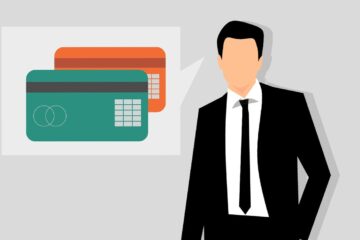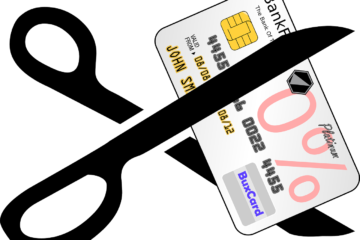Credit card interest. Even thinking about it just makes me a little nauseous. The interest that you pay on credit cards is probably the highest that you will pay for any borrowed money in your life unless you go to a loan shark or a payday lender. Everyone knows that credit card interest is high but most people don’t really know how high it is.
But before we get too far in depth about credit card interest, just let me say that PLEASE do not carry a balance on your credit cards. Most people do. In fact, about 55% of people that have a credit card carry a balance. Ouch. To make matters worse, the average credit card interest rate is nearly 18%. Ouch again. And to make matters just that much worse, the average balance of a credit card holder is $6,194. Triple ouch.
If you get nothing else from this article, get this: Do not carry a balance on your credit cards. Pay them off each month. If you can’t pay them off right now, stop using them (yes, even if you get points) and pay them off as soon as possible. You cannot become wealthy (or even middle class) by carrying a balance on your credit cards consistently.
So now that we’ve gotten that out of the way, but before we get into the nerd-out part of the article, let me show you the other ways that you can get screwed by a credit card company.
There are five main ways that credit card companies make money off of you.
- Annual fees: Roughly 32% of credit cards charge an annual fee. On average the annual fee is about $110. Sometimes there can be perks to a card that charges an annual fee, but normally a fee is charged to someone that is considered a subprime borrower (a borrower with not so good credit).
- Cash advance fees: 96% of credit cards charge a cash advance fee. The fee is usually 5-8% of the amount that you withdraw. A cash advance on a credit card is where you use your credit credit card at an ATM or a bank and take out cash instead of using the card at a vendor or a store.
- Balance transfer fees: About 72% of credit cards charge some kind of balance transfer fee. But sometimes a card will have an introductory offer to transfer your credit card balance to them for a limited amount of time for no fee. Typically the fee is about 3%. This is used when you transfer the balance of one credit card to another.
- Late fees: Late fees are capped by federal law at $28 for the first offense and $39 for the second offense in the same six-month billing cycle. On top of that, the credit card company will charge you an average of $34 IN ADDITION to the late fee if your payment comes back as insufficient funds. And if you fall more than 60 days behind, your interest rate will go up too. #KickInThePantsX3
- Interest: The average minimum APR (annual percentage rate) for credit cards is 18%. Although rates can be as low as 0%, rates can also be as high as you can imagine. Some states have enacted laws to limit how much credit card companies can charge in their states, currently there is no federal law doing so.
So now that you know the ways that you can get kicked in the pants by a credit card company if you carry a balance, get charged an annual fee, take a cash advance, transfer a balance, or pay late, let’s dive into how the biggest portion of credit card changes work.
TIP: The way that credit card interest works is basically the same as nearly every other loan (student loans, mortgages, car loans, personal loans, etc.). It is just more pronounced in credit cards because of the interest rate being much higher than nearly every other loan.
CREDIT CARD MYTH: It doesn’t matter how fast I pay off my credit card because all of the interest is paid up front anyway.
Not true.
The biggest thing to remember when you are trying to figure out how much interest you are paying on a credit card is that interest is calculated monthly. You do not prepay the interest.
Let’s look at a perfectly average credit card as an example. On this credit card, you are not behind on any payments, you have already paid an annual fee (or don’t have one), and you have done no balance transfers or cash advances. We’re only going to look at the interest accrued.
You have a credit card with a balance of $7,000 and an APR of 18%. To calculate your interest you must do some 8th grade math. You use this formula:
(Balance * APR) / 12 months = Interest owed this month
$7,000 * .18 = $1,260 (interest owed on an annual basis)
$1,260 / 12 months = $105
$105 is the amount of interest that you will owe for this month. This is NOT your monthly payment. Typically monthly payments are about 2% of the outstanding balance.
That means that your monthly payment will be $140 and of that payment, $105 will go to interest. That means that you are only paying down the principal by $35 (even though you just paid $140). That sucks!
That means that after your payment of $140 (of which only $35 went to principal), you will now have a balance of $6,965 left on the card to pay the next month.
So let’s look at the next month with the same formula, just with a starting balance of $6,965 instead of $7,000 like the previous month.
(Balance * APR) / 12 months = Interest owed this month
$6,965 * .18 = $1,253.70 (interest owed on an annual basis)
$1,253.70 / 12 months = $104.48
This month you will owe $104.48 in interest instead of the $105 that you owed last month. You’re heading in the right direction. Just so slowly!
So your payment this month will be $140 again. And of that payment $104.48 will go toward interest. That means that you are only paying down the principal by $35.52. A little bit better than the $35 last month, but it still sucks.
So each month that you make a payment (and don’t use the card anymore) you will pay a little less interest than the month before. Here’s a chart so see how it works a little better.
| Month | Balance | APR | Monthly Interest | Payment | Principal Reduction | Ending Balance |
| 1 | $7,000 | 18% | $105.00 | $140 | $35.00 | $6,965.00 |
| 12 | $6584.79 | 18% | $98.77 | $140 | $41.23 | $6,543.56 |
| 24 | $6,047.12 | 18% | $90.71 | $140 | $49.29 | $5,997.83 |
| 36 | $5,404.28 | 18% | $81.06 | $140 | $58.94 | $5,345.34 |
| 48 | $4,635.68 | 18% | $69.54 | $140 | $70.46 | $4,565.22 |
| 60 | $3,716.74 | 18% | $55.75 | $140 | $84.25 | $3,632.49 |
| 72 | $2,618.03 | 18% | $39.27 | $140 | $100.73 | $2,517.30 |
| 84 | $1,304.39 | 18% | $19.57 | $140 | $120.43 | $1,183.96 |
| 94 | $15.42 | 18% | $0.23 | $140 | $15.42 | $0 |
As you can see, if you pay the regular payment of $140 every month, it will take you 7 years and 10 months to pay off your credit card! That’s crazy! Also, you will pay a total amount of $13,035 just to pay off your $7,000 credit card. That means that you are paying $6,035 in interest! Holy cow!
So please pay off your credit cards each month. And if you can’t then just don’t use them at all.
If you can’t pay off your credit cards every month in full, you are not financially responsible enough to have them in the first place.
The truth can be painful sometimes. But sometimes we all need to hear it.
So here’s a good question that I have been asked several times. “I don’t have the money to pay off my credit cards right now, how do I pay less interest on them and get them paid off sooner?”
That’s a great question.
Just pay extra on them every month until they are paid off. If you pay extra on your credit cards (or any other debt for that matter) it will go directly on the principal.
Here’s a chart to show how much faster you can pay off your $7,000 credit card if you put extra money toward the payment.
| Extra Payment | Total Interest Saved | Time to Pay Off Credit Card |
| $0.00 | $0.00 | 7 Years 10 Months |
| $5.00 | $493.00 | 7 Years 3 Months |
| $25.00 | $1,824.74 | 5 Years 8 Months |
| $50.00 | $2,770.67 | 4 Years 7 Months |
| $100.00 | $3,760.54 | 3 Years 2 Months |
| $150.00 | $4,279.48 | 2 Years 6 Months |
| $200.00 | $4,600.46 | 2 Years |
| $250.00 | $4,819.36 | 1 Year 9 Months |
See, the moral of the story is: Don’t ever carry a balance on a credit card. And if you already have one, then make a plan to pay it off as quickly as possible. Even a little extra money every month can save you tons of money in the future.
So I hope that you have a better understanding of how credit card companies can screw you over. And now you have a bigger Money Muscle to punch them in the face. Until next time!



0 Comments